
Balard Chemistry Analysis and Characterization Platform (PAC Chimie Balard)
Content type : Page
The Plateforme d'Analyse et de Caractérisation (PAC) brings together equipment from the Pôle de Chimie Balard institutes (ICGM, IBMM, IEM and ICSM), ENSCM and the University of Montpellier's common services for chemistry. The aim of this platform is to provide users with cutting-edge equipment and a network of skills in the chemical sciences. The PAC comprises 4 entities: the Physical Measurement Laboratory (LMP), the X-ray and Gamma-ray Network (RRXG), the Electronic and Analytical Microscopy Platform (MEA), and the Technical Platform (PT-ICGM). Its activities focus on 3 main areas: Analysis and characterization of solids and materials Characterization of organic molecules and macromolecules Characterization of materials and fluids associated with separative processes The Analysis and Characterization Platform offers exceptional measurement capabilities in X-ray Diffraction, Electron Microscopy, NMR spectroscopy, IR - Raman spectroscopy, Mössbauer spectrometry, SQUID magnetometry, EPR spectroscopy, XPS, mass spectrometry, textural and granulometric analysis, chemical analysis (elemental analysis, AAS, ICP-MS, X-ray fluorescence), calorimetric and thermal analysis, dielectric spectroscopy. The various departments are organized around centers of expertise based on technical staff dedicated to these instruments, in constant liaison with researchers and Professors specializing in the field. The Plateforme d'Analyse et de Caractérisation du Pôle Chimie Balard is open to the entire academic scientific community, as well as to industry (major groups, SMEs and start-ups). Access to services takes the form of services, collaborations or partnerships, including: analytical services provided by PAC staff, research and development projects, methodological and instrumental developments, and theoretical and practical training. Label: Unité d'Appui et de Research (UAR)Main supervisory bodies: UM - CNRS - ENSCResearch division: Chemistry division

Host-Vector-Parasite-Environment Interactions in Neglected Tropical Diseases Caused by Trypanosomatidae (INTERTRYP)
Content type : Page
A research unit dedicated to combating neglected tropical diseases caused by Trypanosomatidae to improve human and animal health Our research focuses on the integrated study of human and animal trypanosomoses, leishmaniasis and Chagas disease, with a One Health approach, in order to improve the control and elimination of these diseases. We are a WHO Collaborating Centre and an OIE Reference Laboratory. Label: Unité Mixte de Research (UMR)Primary supervisors: CIRAD - IRDSecondary supervisors: UMP Research cluster: Pôle Biologie-Santé (BS)Doctoral schools: CBS2: Chemical and Biological Sciences for Health - GAIA: Biodiversity, Agriculture, Food, Environment, Land, Water Website

Montpellier-Ecology, Evolution, Biodiversity (MEEB)
Content type : Page
Label: Unité d'Appui et de Research (UAR)Main supervisors: CNRS - UMPôle de recherche: Pôle Agriculture-Environnement-Biodiversité (AEB)

Water Management, Actors, Users (G-EAU)
Content type : Page
The UMR Gestion de l'Eau, Acteurs, Usages brings together 90 permanent researchers and engineers and some 50 PhD and post-doctoral students from all disciplines, working together on integrated and adaptive water management issues. It conducts research on the trajectories of socio-hydrosystems and their regulation; it contributes to the design and evaluation of tools facilitating the implementation of innovative public policies concerning water; it participates in the multidisciplinary training of students in the field of water. UMR G-EAU, which is part of the MUSE I-Site, is a member of ICIREWARD, a UNESCO Category 2 center on water in Montpellier. The core of UMR G-EAU's project is to understand the functioning of socio-hydrosystems, both in normal operation and in times of crisis or stress (shortage, flooding, pollution). We analyze hydrological, technical, social, economic and political processes within a water-related territory, and their consequences. We are also mobilizing our interdisciplinary strength to analyze the combined effects of these processes, and ultimately to identify the possibilities for governance and adaptation in complex and uncertain environments. The project includes the design and testing, in interaction with society, of tools and devices aimed at revealing the workings of these systems and intervening on their trajectory. Originating from teams working on irrigated systems, the UMR G-EAU has gradually broadened its focus towards integrated management. It now approaches water-related territories as complex systems, mobilizing a diversity of viewpoints: Plurality of uses and interests: irrigation, drinking water, recreation, energy, purification, flood protection Plurality of water types: surface water, groundwater, wastewater Plurality of processes: water and pollutant transfers, irrigation technologies, economic instruments, public participation, modes of appropriation Plurality of regulation modes: river and canal infrastructures, water access and land use policies, water use standards. Plurality of disciplines For all its research, UMR G-EAU emphasizes approaches rooted in case studies. This means investing in research based on field observation, complemented by experimental approaches carried out in interaction with users and/or managers. To build on the knowledge thus generated, the UMR relies on a wide network of partners and research sites throughout the world, in France and in developing countries, representing a diversity of water-related issues and hydro-ecological, socio-economic and political contexts. A third of our staff are expatriates in North Africa, West and Southern Africa, and South-East Asia. In France, we work closely with institutions in charge of watershed management. Our involvement in the field has led to close interaction with the players involved. Finally, UMR G-EAU is committed to transferring its results. To this end, we mobilize three avenues: Testing proposed techniques and instruments with local institutions, training students in the North in the Montpellier Water Master's program and in the engineering schools that oversee the UMR (Montpellier SupAgro and AgroParisTech), and in the South in Master's programs run by our host partners, and welcoming partner companies, particularly start-ups. Label: Unité Mixte de Research (UMR)Main supervisory bodies: CIRAD - IRD - INRAE - AgroParis Tech - Institut Agro - BRGMSecondary supervisory body: UMPôle de recherche: Pôle Agriculture-Environnement-Biodiversité (AEB)Doctoral schools: EDEG: Economics Management - GAIA: Biodiversity, Agriculture, Food, Environment, Land, Water Website

Montpellier University Space Center (CSUM)
Content type : Page
The Centre Spatial de l'Université de Montpellier (CSUM) is the French leader in the development and launch of academic nanosatellites. The CSUM is a Research Support Unit of the University of Montpellier (UAR UM 502) for the support of training and research through the engineering of nanosatellites. Label : Unité d'Appui et de Research (UAR)Tutelles principales : UMPôle de recherche : Mathématiques, Informatique, Physique et Systèmes (MIPS) Site web
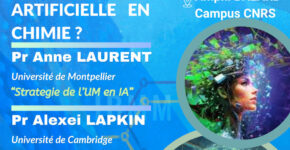
What is the use of Artificial Intelligence in Chemistry?
Content type : Agenda
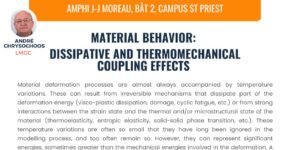
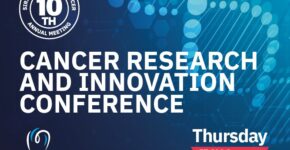
10th annual meeting of the Montpellier Cancer SIRIC
Content type : Agenda

David Mouillot: Of fish and men
Content type: Portrait
After studying the impact of human activities on marine biodiversity, David Mouillot is now looking at the possible impact of coastal marine resources in reducing human poverty. The professor at the University of Montpellier and researcher in the Marbec laboratory has just been awarded an ERC Advanced grant to conduct transdisciplinary research on this new subject.
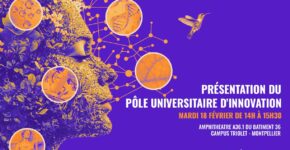
Presentation of the University Innovation Cluster within the AEB and BS Clusters
Content type : Agenda

Celebrating Women in Chemistry
Content type : Agenda


Mini-symposium Sustainable Chemistry for Health and Energy: from LABUM to PTLs
Content type : Agenda
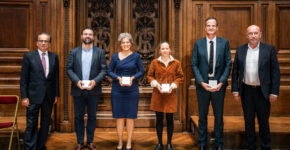
Six new IUF laureates from the University of Montpellier in 2024
Content type: Brief
Published on: October 22, 2024
Six teacher-researchers and Professors from the University of Montpellier are...
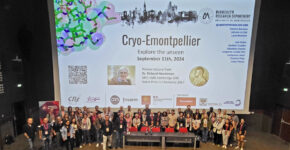
Cryo-EMontpellier Day
Content type: Brief
Published on: September 26, 2024
Cryo-electron microscopy is a central methodology in structural biology and in the...
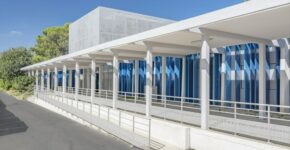
Inauguration of the first renovated building for Montpellier's physics laboratories
Content type : Press release
Published on: September 25, 2024
Sophie Béjean, Rector of the Occitanie academic region, Rector of the...